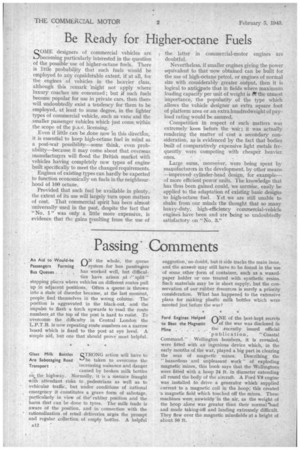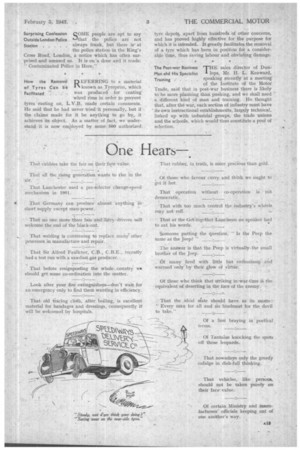rassing . Comments An Aid to Would-be n N the whole, thequeue Passengers Forming 1 -Isystem for bus passtngers
Page 14

Page 15

If you've noticed an error in this article please click here to report it so we can fix it.
Bus Queues. . . has worked well, but difficul
ties have arisen ,at /" split" stopping places .where vehicles on different routes pull up in adjacent positions. Often a queue is thrown into a state of disorder because, at the last moment, people find -themselves in the wrong column. The position is aggravated in the black-out, and the impulse to flash a torch upwards to read the route numbers, at the top of the post is hard toresist. To overcome the difficulty in Central London the L.P.T.B. is now repeating route numbers on a narrow board which is fixed to the post -at eye level. A simple aid, but one that should prove most helpful.
Glass Milk Bottles QTRONG action will have to Are Sabotaging Road IN-) be taken to overcome the Transport . . . increasing nuisance and danger caused by broken milk bottles o'n the highway. Normally, it is a Menace fraught with attendant risks to pedestrians as well as to vehicular traffic, but under conditions of national emergency it constitutes a grave form of sabotage, • particularly in. view of the' rubber position and the harm that can be done to tyres. The milk trade is aware of the position. and in connection with the rationalization of retail deliveries urges the prompt and regular collection, of empty bottles. A helpful
A1.2 suggestion; no doubt, but it side tracks the main issue, and the answer may still have to be found in the use of some other -form of container, such as a waxedpaper holder or one treated with synthetic resins. Such materials may be in short supply, but the conservation of our rubber iesources is surely a priority consideration. What has happened to the extensive plans for making plastic milk bottles which were mooted just before the war?
Ford Engines Helped nNE of the best-kept secrets to Beat the Magnetic %--lof the war was disclosed in Mine . the .cecently issued official
'publication, "Coastal Command." Wellington bombers, it is revealed, were fitted with an ingenious device which, in the early months of the war, played a big part in clearing the seas of magnetic mines. Describing, the "hazardous and unpleasant work" of exploding magnetic mines, this book says that the Wellingtons were fitted with a hoop 24 ft. in diameter extending all round the body of the aircraft. A Ford VS engine was installed to drive a generator which supplied current to a magnetic coil in the hoop; this created -a magnetie field which touched of the mines. These machines were unwieldy in the air, as the weight of the hoop alone was greater than their normalsload and made taking-off and landing extremely difficult. They flew over the magnetic minefields at a height of about 50 ft. Surprising Confession SOME people are apt to say Outside London Police 0—'that the police are not
Station always frank, but there is' at
the police station in the King's Cross Road, London, a notice which has often surprised and amused us. it is on 'a door and it reads: " Contaminated Police in Here."
How the Removal REFERRING to a material
of , Tyres Can be known as Tyreprirn, which
Facilitated was produced for coating wheel rims in order to prevent tyres rusting on, L.V.B. made certain comments. He said that he had never tried it personally, but if the claims made for it be anything to go by, it achieves its object. As a matter of fact, we understand it is now em.Ployed by some 500 authorized tyredepots, apart from hundreds of other concerns, and has proved highly effective for the purpose for which it is intended. It greatly facilitates the removal of a tyre which has been in position for a considerable time, thus saving labour and obviating damage.
The Post-war BusinessE sales director of DunMan and His Specialist TfOlps, Mr. H. L. Kenward, Training . . speaking recently at a meeting of the Institute of the Motor Trade, said that in post-war business there is likely to be more planning than pushing, and we shall need a dLfferent kind of man and training. He thought that, after the war, each section of industry must have its own instructional establishments, largely technical, linked up with industrial groups, the trade unions and the schools, which would thus constitute a pool of selection.




















































